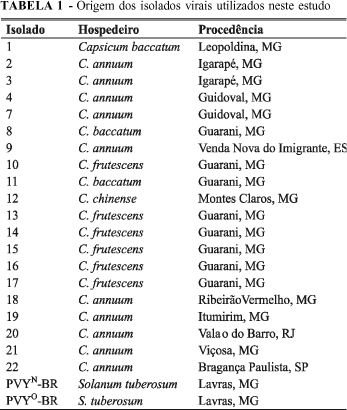Twenty isolates were obtained from Capsicum spp. plants in the states of Minas Gerais, São Paulo, Espírito Santo and Rio de Janeiro. The isolates were biologically characterized using a host range assay and inoculation into a series of differential sweetpepper (Capsicum annuum) cultivars. Two isolates from potato (Solanum tuberosum) (PVY N-BR e PVY O-BR) were used as controls. The isolates displayed a high degree of biological variability, although they were all preliminarly identified as Potato virus Y (PVY). The reaction in the differential cultivars enabled the classification of the isolates as pathotypes 1 or 1.2 of PVY. The production of antiserum was carried out using purified virions of one mild and one severe isolate. Using these antisera in indirect ELISA, positive reactions against all the isolates were observed. The antisera also reacted against PVY N-BR and PVY O-BR, although the latter reacted weakly. For molecular characterization, the polymerase (NIb) and capsid protein (cp) genes and the 3' non-translated region (3'NTR) of biologically distinct isolates were cloned and sequenced. Phylogenetic analysis confirmed the identity of six isolates as Pepper yellow mosaic virus (PepYMV), a potyvirus recently described infecting sweet pepper (Capsicum annuum) in Brazil. This result suggests that PepYMV could be the predominant potyvirus causing mosaic in Capsicum species in Brazil. Since PepYMV isolates have host ranges similar to PVY (including the reaction in differential cultivars), and the two viruses cross-react serologically, the usefulness of the molecular analysis is demonstrated in the identification of potyviruses from Capsicum spp.





